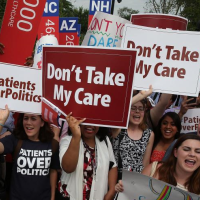Only 1 in 4 Americans Want Health Care Law Repealed
 Demonstrators show their support of Obamacare (photo: Mark Wilson, Getty Images)
Demonstrators show their support of Obamacare (photo: Mark Wilson, Getty Images)
By Ricardo Alonso-Zaldivar, Associated Press
WASHINGTON (AP) — Only about 1 in 4 people in the United States wants President-elect Donald Trump to entirely repeal his predecessor's health care law that extended coverage to millions, according to a poll.
The postelection survey released Thursday by the nonpartisan Kaiser Family Foundation also found hints of a pragmatic shift among some Republican foes of President Barack Obama's law.
While 52 percent of Republicans say they want the law completely repealed, that share is down from 69 percent just last month, before the election. More Republicans now say they want the law "scaled back" under Trump and the Republican-controlled, with that share more than doubling from 11 percent before the Nov. 8 election to 24 percent after.
Kaiser CEO Drew Altman said the foundation's polling experts aren't quite sure what to make of that finding. The organization is a clearinghouse for information and analysis about the health care system.
It could be that some Republicans "got a protest vote off their chests, and they're done with that," Altman said. "They now have a more moderate position."
Trump called the Affordable Care Act a "disaster" during an election campaign that saw big premium increases announced in its closing days. After the vote, Trump has been saying he'd like to keep parts of the law.
With open enrollment underway, no changes are expected next year for the more than 10 million people currently covered through HealthCare.gov and state markets that offer subsidized private insurance. An additional estimated 9 million low-income people covered by Medicaid in states that expanded the program are also safe for now.
HealthCare.gov sign-ups are running a little higher than last year — 2.1 million through last Saturday, as compared with about 2 million. But the share of new customers is down, 24 percent this year versus 35 percent last year at about the same time. The markets need an influx of younger, healthier consumers to help keep premiums in check.
On Capitol Hill, Republican leaders want to quickly repeal the law before an interlude and segue to a replacement. That approach carries political risk because the replacement legislation could bog down and there's no guarantee of success. The uncertainty could disrupt coverage for millions by destabilizing fragile insurance markets.
The poll found some skepticism about that approach. Forty-two percent of those who want the 2010 law repealed said lawmakers should wait until they figure out the details of a replacement plan before doing so.
Overall, 30 percent said the new president and Congress should expand what the law does, and 19 percent said it should be implemented as is. On the other side, 26 percent said the law should be entirely repealed and 17 percent called for it to be scaled back.
Among Trump voters, 8 in 10 viewed the health care law unfavorably, and half wanted it entirely repealed.
As Republicans start to make changes in health care, potentially revamping Medicare and Medicaid as well, the politics of the issue could turn against them, Altman said. "They are going to go from casting stones to owning the problem," he said.
The poll found majorities across party lines support many of the health care law's provisions, but not its requirement that individuals have coverage or risk fines, and its mandate that medium-to-large employers pay fines if they don't offer health insurance.
Among the provisions with support across party lines:
—allowing young adults to stay on a parent's insurance until age 26.
—no copayments for many preventive services.
—closing the Medicare prescription drug coverage gap known as the "doughnut hole."
—financial help for low- and moderate-income people to pay their insurance premiums.
—a state option to expand Medicaid to cover more low-income adults.
—barring insurance companies from denying coverage because of a person's medical history.
—increased Medicare payroll taxes for upper-income earners.
The telephone poll was conducted from Nov. 15-21 among a nationally representative random digit dial sample of 1,202 adults, including people reached by landlines and cellphones. The margin of sampling error is plus or minus 3 percentage points for the full sample. For subgroups, the margin of sampling error may be higher.
To Learn More:
Kaiser Health Tracking Poll: November 2016 (by Ashley Kirzinger, Elise Sugarman, and Mollyann Brodie, Kaiser Family Foundation)
Health Care Law Successes Pose Problem for Republicans Who Denounce It (by Ricardo Alonso-Zaldivar, Associated Press)
Repeal of Affordable Care Act would Increase Output, but would also Increase Deficit and Number of Uninsured (by Steve Straehley, AllGov)
Republicans Strike Out in Search for Americans Hurt by Obamacare (by Noel Brinkerhoff, AllGov)
- Top Stories
- Unusual News
- Where is the Money Going?
- Controversies
- U.S. and the World
- Appointments and Resignations
- Latest News
- Trump Renames National Football League National Trump League
- Trump to Stop Deportations If…
- Trump Denounces World Series
- What If China Invaded the United States?
- Donald Trump Has a Mental Health Problem and It Has a Name






Comments